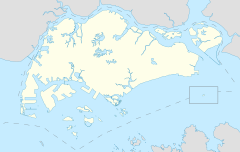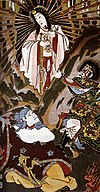Syonan Shrine
| Syonan Jinja Shōnan Shrine 昭南神社 | |
|---|---|
 The near-completed Syonan Jinja in 1942 | |
| Religion | |
| Affiliation | Shinto |
| Deity | Amaterasu |
| Type | Shinto shrine |
| Location | |
| Location | MacRitchie Reservoir, Singapore |
| Geographic coordinates | 1°20′53.6″N 103°48′49.7″E / 1.348222°N 103.813806°E |
| Architecture | |
| Date established | 7 May 1942 |
| Destroyed | 15 August 1945 |
Syonan Jinja (昭南神社, Shōnan Jinja, lit. "Shōnan Shrine") was a Shinto shrine at MacRitchie Reservoir, Singapore. Built by the Japanese Imperial Army during the Japanese occupation of Singapore in World War II, the shrine was destroyed directly before British forces re-occupied Singapore.[1]
Located deep inside the Central Catchment Nature Reserve (CCNR), the National Heritage Board (NHB) declared the site a historic site in 2002, although no plans have been made public so far to develop or make any significant changes to the site since the war.[2]
History
[edit]The Syonan Jinja (Light of the South Shrine) was envisioned to be a shrine that commemorated the many Japanese soldiers and military personnel who fell in the Japanese conquest of Singapore.[3]
The construction of Syonan Jinja was significant. Major Yasuji Tamura, the commander of the Japanese 5th Division's Engineers Regiment and the man in-charge of the design and the construction of the Syonan Jinja, had envisioned for the shrine in Singapore to be best Shinto shrine in the whole of the southern areas of Asia that has come under Japanese occupation. It was also to be the second-greatest shrine of the Shinto faith after the Meiji Shrine in Tokyo, Japan.[3]
Destruction
[edit]Just before the Japanese officially surrendered on 15 August 1945, they decided to destroy and burn the shrine to the ground in fear of its desecration by the returning British colonial forces.[3]
Preservation
[edit]The ruins of Syonan Jinja – now down to a few remaining support structures and broken pieces and chunks – can still be found in the dense tropical forest of the Central Catchment Nature Reserve (CCNR), in which includes the MacRitchie Reservoir.[4]
The remnants of the old shrine were designated as a historical site by the NHB in 2002.[3] However, the historical site remains inaccessible to the public due to the strong current deep stream and the presence of wild animals.[4]
References
[edit]- ^ Heok, Tay Jin (24 August 2021). "Syonan Jinja: Singapore's Hidden Shrine That Is The Grandest After The Meiji Shrine In Tokyo". TheSmartLocal. Retrieved 19 April 2022.
- ^ Yap, Gracia (2 November 2020). "Fast facts about the Syonan Jinja". The New Paper. Retrieved 19 April 2022.
- ^ a b c d "Syonan Jinja on Infopedia". National Library Board. 24 December 2004. Archived from the original on 2 October 2015. Retrieved 11 August 2015.
- ^ a b "Syonan Jinja". National Heritage Board. Archived from the original on 23 October 2015. Retrieved 11 August 2015.
Gallery
[edit]-
Japanese army and navy officers visiting the Shonan Jinja in 1943
-
Japanese postage stamp depicting Shonan Jinja
External links
[edit]- Japanese occupation of Singapore
- 20th-century Shinto shrines
- Religious buildings and structures in Singapore
- Shinto shrines in the Japanese colonial empire
- Religious buildings and structures completed in 1942
- 1942 establishments in the Japanese colonial empire
- 1945 disestablishments in the Japanese colonial empire
- 20th-century architecture in Singapore
- Shinmei shrines




